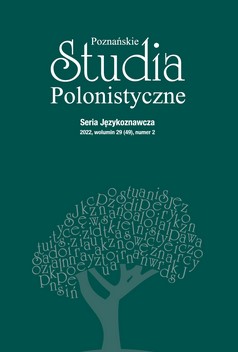Modyfikacje znaczenia i walencji związków frazeologicznych jako mechanizm frazeotwórczy
Modifications of Meaning and Valency of Phrasemes as a Phraseological Mechanism
Author(s): Jolanta Ignatowicz-SkowrońskaSubject(s): Semantics, Western Slavic Languages, Phraseology
Published by: Uniwersytet Adama Mickiewicza
Keywords: phraseology; valency of phraseological units; semantic enrichment; modifications of phraseological units; appearance of new phraseological units;
Summary/Abstract: The article in its entirely is a phraseography commentary on the neo-phraseologism łykać // łyknąć coś jak (młody) pelikan [literal translation = to swallow something like a (young) pelican]. The author makes a formal and functional description of this element of colloquial Polish which migrates to the sphere of contacts supported by general Polish. The source base are network resources, including specialist collections – corpora (e.g. the SketchEngine platform, Narodowy Korpus Języka Polskiego [the National Corpus of Polish]). The article deals with the semantic and valence modifications of three phraseological units: leżeć i kwiczeć, mieć na pieńku and grać pierwsze skrzypce. Initially, these units were connected with personal nouns only and appeared in the multi-word lexical units ktoś leży i kwiczy (‘someone is in a predicament, has no choice’), ktoś ma z kimś na pieńku (‘someone wants to complain about something to somebody, someone bears a grudge against someone) and ktoś gra pierwsze skrzypce (‘someone controls, leads or makes decisions’). Eventually, new phrasemes appeared due to the enrichment of meaning of the units and modification of their semantic and selective valency: coś leży i kwiczy (‘something does not work, neither develops nor evolves, does not meet requirements or expectations’), ktoś ma z czymś na pieńku (‘someone does not follow the rules, does not act accordingly or acceptably’) and coś gra pierwsze skrzypce (‘something is most important or dominating, something is in a controlling position’). The research proved that the process of the appearance of these lexical units was facilitated by the language users’ tendency to forget the motivation of the units and the evolution of their semantics towards the content which would enable connectivity with impersonal nouns.
Journal: Poznańskie Studia Polonistyczne. Seria Językoznawcza
- Issue Year: 29/2022
- Issue No: 2
- Page Range: 91-105
- Page Count: 15
- Language: Polish

